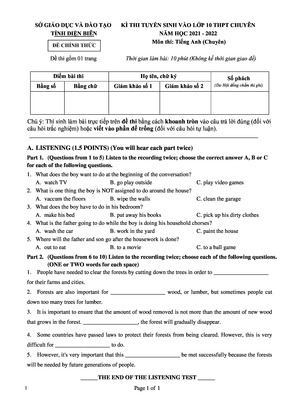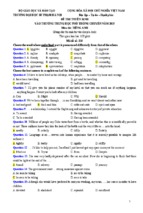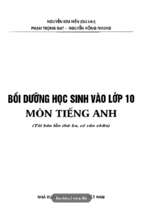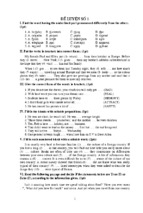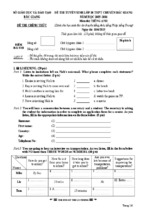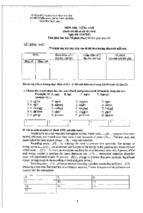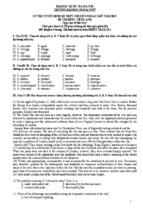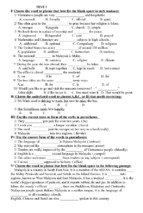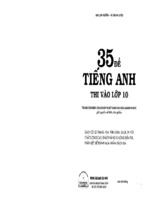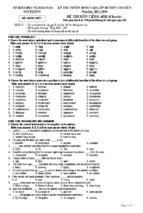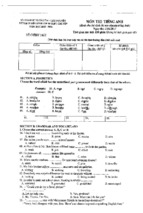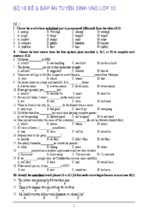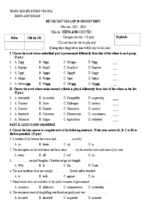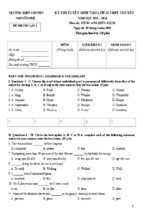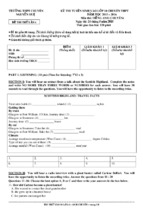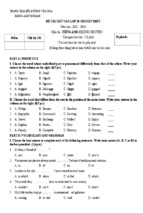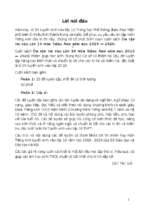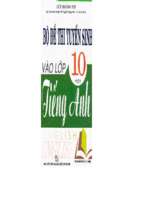PHẦN A : CÁC CHUYÊN ĐỀ NGỮ PHÁP
Chapter 1: tenses in english
A.The simple present tense: ( Thì hiện tại thường )
I. The form: ( CÊu tróc)
- “To be”: am / is / are
(+) I + am
She/ He/ It + is
We/ You/ They + are
(-) I am not
She/ He/ It + is not (isn’t)
We/ You/ They + are not (aren’t)
(?) Am I ?
Is she/ he/ it ?
Are we/ you/ they?
- Ordinary verbs: ( động từ thường)
(+) I / We/ You/ They + V
She/ He/ It + V(s, es)
(-) I/ We/ You/ They + don’t + V(infinitive without ‘to’)
She/ He/ It + doesn’t + V(infinitive without ‘to’)
(?) Do + I/ we/ you/ they + V(infinitive without ‘to’)?
Does + she/ he/ it + V(infinitive without ‘to’) ?
II. The usage: ( Cách sử dụng)
- Được dùng để diễn tả hành động sự việc được lặp đi lặp lại nhiều lần, thói
quen hoặc sở thích.
Ex: She never comes late
She writes to her mother twice a month
They like drinking coffee.
- Được dùng để diễn tả một sự thật hiển nhiên
Ex: The earth moves around the Sun
Water boils at 1000C
- Để diễn tả thời gian biểu, kế hoạch, dự đoán,…….
Ex: The train leaves at 9.00
III. Notes: (Chú ý)
* The recognition: (Dấu hiệu nhận biết) Có một số từ và cụm từ như:
- always/ usually/ often/ sometimes/ occasionally/ seldom/never ….
Everyday/ week/ month/year….,once aweek, twice a year…
* Cách thêm ‘s, es’
- Thêm ‘es’ vào sau các động từ kết thúc tận cùng: o, ch, sh, s, x.
1
- Thêm ‘s’ vào sau các động từ còn lại
* Cách đọc khi thêm ‘e, es’
- Đọc là /iz/ khi động từ kết thúc là: ch, sh, s, x
- Đọc là /s/ khi động từ kết thúc là: k, p, t ,f
- Đọc là /z/ với các động từ còn lại.
Exercise: Dùng động từ trong ngoặc ở thì Simple Present
1. Water ( boil ) at 100 0 C.
2. Nam usually ( get ) up at 6.00 ?
3. What you often ( have ) for lunch ?
4. She’ very clever. She ( speak ) 4 languages.
5. Steve ( smoke ) ten cigarettes a day.
6. An insect ( have ) six legs.
7. She often ( visit ) you at weekend ?
8. Mary ( wash ) her teeth twice a day.
9. You often ( watch ) film in the evening ?
10. Mary ( swim ) very well ?
11. She ( not/like ) watching T.V.
12. She ( get ) at 6. o’clock, and ( go ) to school at 7 o’clock.
13. He ( not/ usually/ drive ) to work. He usually ( walk ).
14. Kangaroo ( see ) everywhere in Australia.
15. My father ( drink ) coffee every morning.
16. At Christmas, people often ( decorate ) a tree.
17. It ( not rain ) in the dry season.
18. Nam often ( visit ) you on Sunday ?
- No. He ( visit ) me on Saturday
19. What time she ( finish ) work everyday ?
- She ( finish ) it at 16.00
20. My mother ( take ) Jim to the dentist many times.
21. My little sister ( drink ) milk everyday.
22. Long ( like ) tennis ? - No. He ( like ) badminton.
23. The Earth ( move ) around the Sun
24. The Sun ( rise ) in the East and ( set ) in the West
25. What you often ( do ) in your free time?
B. The present progressive tense: ( Thì hiện tại tiếp diễn )
I. The form:(cÊu tróc )
(+) I + am + V-ing
We/ You/ They + are + V-ing
He/ She/ It + is + V-ing
(-) I + am not + V-ing
We/ You/ They + are not ( aren’t) + V-ing
He/ She/ It + is not (isn’t) + V-ing
(?) Am + I + V-ing ?
2
Are + we/ you/ they + V-ing ?
Is + she/ he/ it + V-ing ?
II. The usage: (Cách sử dụng)
a/ Được sử dụng để diễn tả hành động hoặc sự việc đang sảy ra tại thời điểm nói
They are watching TV at the moment
b/ Hµnh ®éng nãi chung ®ang diÔn ra nhng kh«ng nhÊt thiÕt ph¶I thùc sù diÔn ra
ngay lóc nãi.
Ex: I am writing a novel now.
III. Notes: (Chú ý )
* The recognition: (Dấu hiệu nhận biết) Có một số từ và cụm từ như:
- now/ at present/ at this time/ at the moment.
* Các động từ kết thúc tận cùng là: ‘e’ ta phải bỏ ‘e’ trước khi thêm ING
Come - Coming
* Một số động từ kết thúc tận cùng là: ‘ie’ phải chuyển thành ‘y’ trước khi thêm
đuôi ‘ing’:
Lie - Lying
* Nhân đôi phụ âm cuối khi động từ kết thúc bằng: Phụ - Nguyên - Phụ
( dùng cho động từ một âm tiết, hai âm tiết thì trọng âm phải ở âm tiết thứ
hai )
( getting, running, having, writing, dying, lying,…)
* Một số động từ thường hay không sử dụng ở dạng hiện tại tiếp diễn:
be/ see/ hear/ understand/ know/ like/ want/ glance/ feel/ think/ smell/ love/
hate/ realize/ seem/ remember/ forget/………( Nếu như thế ta thay thể bằng thì
hiện tại thường )
Exercise: Dùng động từ trong ngoặc ở thì Present Progressive
1. She’s tired. She ( sleep ) .........now.
2. Tom ( plant ) the trees in the garden at the moment ?
3. What you ( do ) now ?
4. Listen ! someone ( knock ) on the front door.
5. He ( write ) a novel at present.
6. They ( watch ) T.V at present ?
- No. They ( listen ) to the radio
7. He and I ( play ) soccer at the moment.
8. Tom and I ( be ) busy at the moment.
9. They ( see ) a movie at the moment.
10. We ( want ) to go to school at the moment.
C. The simple future tense:
I. The form:
(+) S + will + V (infinitive without ‘to’)
(-) S + will not (won’t) + V(infinitive without ‘to’)
(?) Will + S + V(infinitive without ‘to’)?
Shall + I/ We + V(infinitive without ‘to’) ?
3
II. The usage: (Cách sử dụng)
- Để diễn tả hành động sự việc sẽ xảy ra trong tương lai.
Ex: She will visit me next week
Lan and Mai will come here tomorrow.
III. Notes: (Chú ý)
* The recognition:
- tomorrow, next week/ month/ year/…….
Exercise: Dùng động từ trong ngoặc ở thì Simple Future
1. I ( go ) to the zoo tomorrow
2. They ( publish ) a book next year.
3. Where you ( spend ) your holiday next year?
4. I am 13 years old. Next year I ( be ) 14.
5. You ( not / go ) to the movies next Sunday.
6. It ( take ) Lan 5 minutes to go to school next year
7. Mrs. Lan ( take ) Minh to the dentist next times.
8. He and I ( play ) soccer tomorrow morning.
10. They ( meet ) their friends next Christmas?
11. I (be) twenty years old next June
12. There ( be ) sunny next Sunday
13. You ( do ) the exercises tomorrow evening?
C. Simple past
I-form(c«ng thøc)
( + ) S + V(ed/2) + O
( - ) S + didn’t + V(base form) + O
( ? ) Did + S + V(base form)+ O ?
II-uses(c¸ch dïng):
Diễn tả một hành động xảy ra tại một thời điểm xác định trong quá khứ và đã chấm rứt
không còn liên hệ tới hiện tại
Ex: I called him last night
III-DÊu hiÖu nhËn biÕt
Trong câu thường xuất hiện các trạnh từ sau thi câu đó phải chia ở thì quá khứ đơn
giản : yesterday, ago, last …, when I was young , when + s + was/were (a)
child/children ….
D. past progressive:
I-form(c«ng thøc
( + ) S + was/ were + V(-ing) + O
( - ) S + + was/ were + not + V(-ing) + O
( ? ) was/ were + S + V(-ing) + O ?
II-uses(c¸ch dïng):
1. Thì quá khứ tiếp diễn diễn tả một hành động đang xẩy ra tại một thời điểm xác
định trong quá khứ.
Ex: I was watching Tv at 8 last night
4
2. Diễn tả một hành động đang xẩy ra thì có một hành động khác xen vào, hành động
xen vào đó được chia ở thì quá khứ đơn giản. Trong câu thường có when hoặc
while
Ex: when I was having dinner, he came
3. Diễn tả 2 hành động cùng song song xẩy ra
Ex: while I was watching Tv, my father was reading book
I.Put the following verbs into three groups:
/id/:
/t/:
/d/:
wanted, played, helped, fitted, liked, watched, visited, looked, needed, remembered,
stopped, talked, rented, missed, studied, started, used, learned(v),nacked, changed, stayed,
learned(adj),rugged
II.choose the best answer.
1.I (met/was meeting) a friend while I (did/was doing)the shopping.
2.I (turned/was turning) round and (saw/was seeing) Paula.
3.She (wore/was wearing) a bright red coat when I saw her.
4.I (paid/was paying) for my things when I (heard/was hearing) call my name.
5.We(left/was leaving) the cafe and (said/was saying) goodbye.
6.this time last month we (took/were taking) the final test.
7.While we (had/were having) a drink, a waiter (dropped/was dropping) a pile of plates.
8.When I (came/was coming), he (read/was reading) books.
III. correct form of the verbs
1.the doorbell (ring)while Tom (watch) T.V .
2.How fast you(drive)when the accident (happen)
3.Ann and Susan (make).dinn er when Martin (arrive)home.
4.The light (go)out when we (have)dinner, but it (come)on again
after about ten minutes.
5.It suddenly (begin)to rain while Laura (sit)in the garden.
6.What you(do)this time yesterday?
I (work)on the computer.
7.It (be)cold when we (leave)the house that day, and a slight snow (fall)
8.When I last (see)them they (try)to find a new house near their work.
9.I (walk)along the street when I suddenly(feel)something hit me in the back. I
(not/know)what it was.
10.When we (drive)down the hill, a strange object (appear)in the sky.
11.What (you/do)this time yesterday?I was asleep.
12.When we came, he (read)books.
13.I (see)Sue in town yesterday but she (not see)me.she (look)the other way.
14.I(meet)Tom and Ann at the airport a few week ago.They (go) to Berlin and I (go)to
Madrid. We (have)a chat while we(wait) for our flight.
15.I (cycle) home yesterday when suddenly a man (step )out into the road in front of me.I
(go)quite fast but luckly I (manage) to stop in time and (not/hit) him.
5
16.Jane (wait) for me when I (arrive)
17(you/ go) out last night ?No, I was too tired.
18.John (take)a photograph of me while I (not/look)
19.I haven’t seen Alan for ages. When I last (see)him , he(try)to find a job in London
20.I (walk)along the street when suddenly I (hear)footsteps behind me. Somebody
(follow)me. I was frighted and I (start)to run.
E. present perfect:
I-form(c«ng thøc)
( + ) S + Have / Has + V(ed/3) + O
( - ) S + Have / Has + not + V(ed/3) + O
( ? ) Have/Has + S + V(ed/3) + O ?
II-uses(c¸ch dïng):
- Dïng ®Ó diÔn t¶ mét hµnh ®éng ®· xÈy ra trong qu¸ khø vµ cßn kÐo dµi tíi hiÖn t¹i.
Trong c©u thêng xuÊt hiÖn (Since or For)
- Dïng ®Ó diÔn t¶ mét hµnh ®éng võa míi xÈy ra trong c©u thêng xuÊt hiÖn (Just)
- Dïng ®Ó diÔn t¶ mét hµnh ®éng ®· tõng xÈy ra trong c©u thêng xuÊt hiÖn (Ever)
- Dïng ®Ó diÔn t¶ mét hµnh ®éng vÉn cha xÈy ra trong c©u thêng xuÊt hiªn (Yet)
- Dïng ®Ó diÔn t¶ mét hµnh ®éng ®· xÊy ra trong c©u thêng xuÊt hiÖn(Already)
III-DÊu hiÖu nhËn biÕt
Khi trong c©u xuÊt hiÖn c¸c tr¹ng tõ hoÆc côm tõ sau th× c©u ®ã ph¶I ë thÞ hiÖn t¹i hoµn
thµnh: Since,For,Already,yet,ever,recently=lately,so far=up to now,many time = several
time, how long …? It’s the first time + present perfect , It’s the most/adjest + ...
Complete the sentences using SINCE or FOR
1. Linda has been the manage of Timeways travel in London ___three years
2. I’ve lived in Rome_____I was two
3. Mr.Woods hasn’t been feeling well ____over a month
4. Sally and her boyfriend Peter have been going out together____last winter
5. I’ve been waiting ____ a few minutes
6. He’s been in Japan ____ 1986
7. I haven’t seen you ____ christmas
8. It hasn’t rained here _____ more than a month
9. we haven’t bought a new shoes ____ ages
10. We’ve been here ____ january
11. It has been raining..................lunch time.
12. My boss has gone away .............ten days
13. I haved lived in England...............a year.
14. She has lived in London.................1985.
15. Please hurry up We have been waiting .............an hour.
16. I have known her...............January.
17. Nam’s father has worked in this company .................20 years.
18. Have you learned English.........a long time?
19. I haven’t seen Tom................Monday.
20. This house is very dirty. Wer haven’t cleaned it .............ages
Put the verb in the correct tense and insert SINCE or FOR
21. ____ the last two years, clothes (be) very dear
22. Coal (become) dearer ___ the end of last year
23. I (write) ten letters _____ breakfast
6
24. “You (see) my friends lately?” “not ___3 days”
25. I (not see) him ____ more than a week
26. “ How long you(wait)?””____half an hour”
27. That boy (not wash) his face ___ some time
28. I (not have) a good night’s sleep ____ last week
29. She (practice) the piano ___ 6.00
30. Henry (not have) a holiday ____ the year before last
Put the verbs into the present perfect tense
31. I (live) here since 1970
32. He (study) English for three years
33. They (come) here many times
34. He (already read) these books
35. She (just visit) us
36. I (ever see) this cartoon
37. You (ever talk) to her?
38. He(have) lunch yet?
39. We (not see) her parents yet
40. His sister (work) for this company since 1995
41. They (build) those building recently
42. I (not be) successful so far
43. Up to now he (win) the prize
44. It’s the second time he (visit) the USA
45. I (not live) here since he (be) a child
46. This is the nicest restaurant I (ever see)
47. The doctor (be) here since 8 o’clock
48. It (rain) yesterday after it (be) dry for many month
49. We (already choose) the new person for the job
50. You (pay) the taxi-driver yet?
Choose the best answer
1.We’ve been here ............last week.
A. since
B. for
C. by
D. from
2.They haven’t seen each other ...........a long time.
A. since
B. for
C. with
D. about
3.My mother..........in this hospital for 9 years.
A. have worked
B. worked
C. has worked
D. works
4............you had breakfast since 6.00 a. m ?
A. Do
B. Does
C. Have
D. Has
5.I have.........her for some years.
A. know
B. known
C. knew
D. knowing
6............ have you lived here?
A. When
B. How long
C. What time D. What
7.I ...................................my book .I can’t find it anywhere.
A.lost
B.have lost
C.has lost
D. lose
8.For a long time, the ¸Ao dai................the subject of poems,novels,and songs.
A.were
B.was
C.have been
D.has been
9.I don’t know Minh.I............................met him.
A.have never
B.never have
C.haven’t never
D.ever haven’t
10.a teacher.......................he was 20 years old.
7
A.for
B.about
C.at
D.since
Write in correct English
1. I have lived in Ho Chi Minh city since twenty five years
___________________________________________________________
2. They haven’t saw such a terrble fire before
___________________________________________________________
3. the house was cleaned up since we left for Nha Trang
___________________________________________________________
4. The International Olympic Games continued without interrupt since 1896
___________________________________________________________
5. We didn’t try hard enough since the second semester
___________________________________________________________
6. I have known this singer since she has been 16 year old
___________________________________________________________
7. people enjoyed Beethovan’s music for nearly 200 years
___________________________________________________________
8. The boy played soccer since 2 o’clock
___________________________________________________________
9. All my classmates knew each other quite well since they were in grade 6
___________________________________________________________
10. These dancers performed that ballet qute well many times
___________________________________________________________
11. When we visited my friends,they had dinner with their children
___________________________________________________________
12. My father watered the flowers when it was started raining
___________________________________________________________
13. Lan has met her old friends two days ago
___________________________________________________________
14. Phong didn’t see that film before
___________________________________________________________
15. The girls participated in that project twice
___________________________________________________________
16. people speak English in Australia for a long time
___________________________________________________________
17. Her father worked in that hospital since he has moved to this city
___________________________________________________________
18. His sister played piano since she was eight
___________________________________________________________
19. They didn’t see each other for a long
___________________________________________________________
20. The girls have finished their project two days ago
___________________________________________________________
8
Những mẫu câu quan trọng khi viết lại câu ở thì HTHT & QKĐG
-to V........
2. S + started / began
ago
-V_ing.........
in, when
- for........
-> S + have /has + p.p ............
- since.......
2. This is the first time...+ S + have/has +p.p..........
-> S + have/ has + not + p.p............before.
In + năm
3. S + last + Ved/ c2 +.......... when + mệnh đề
Kho ảng th ời gian + ago
-> The last time + S + Ved/c2 +.......+ was + in.... / .....ago.
-> It’s + năm / khoảng tg + since + S + V(ed/c2)...........
-> S + haven’t / hasn’t + p.p...........for / since.............
4. when + did + S + V(bare inf)..........?
-> how long + have/has +S + p.p.......?
When + did + S + last + V(bare inf).......?
-> how long is it + Since + S + last + ved/c2.........?
Rewrite sentences so that the meaning stay the same
1. We haven’t been to the concert for over a year .
The last time ………………………………………………………………………
2. We last saw our grandfather two years ago .
We haven’t …………………………………………………………………………
3. I have never read such a romantic story .
This is ………………………………………………………………………………
4. It’s nearly twenty years since my father saw my uncle
My father ………………………………………………………………………
5. he hasn’t been back to his village for over 20 years .
It’s …………………………………………………………………………………
6. The journey to the village was very interesting to the boys .
We haven’t …………………………………………………………………………
7. The last time we went to a cinema was two years ago .
We haven’t ………………………………………………………………………
8. The last time we saw him was on Monday .
We…………………………………………………………………………………
9. The last time I saw David was in 1989 .
I……………………………………………………………………………………
Chapter 2: wish clause
9
I - §Þnh nghÜa: C©u ao íc lµ c©u diÔn t¶ mét mong íc,mét mong íc kh«ng cã thùc
hoÆc khã cã thÓ xÈy ra.
II – Ph©n lo¹i:
1. C©u ao íc ë hiÖn t¹i: §Ó diÔn ®¹t íc muèn kh«ng cã thùc ë hiÖn t¹i ngêi ta
dïng th× qu¸ khø cña ®éng tõ trong mÖnh ®Ò ®øng sau wish
S 1 + Wish + S 2 + V(ed/2)/were
I don’t know EnglishI wish I knew English
He watches this film He wish he didn’t watch this film
2. C©u ao íc ë qu¸ khø: Dïng ®Ó diÔn t¶ íc muèn kh«ng cã thùc ë qu¸ khø
ngêi ta dïng th× qu¸ khø hoµn thµnh trong mÖnh ®Ò ®øng sau wish
S 1 + Wish + S 2 + had + V(ed/3)
I didn’t have enough money yesterday
I wish I had money yesterday
3. C©u ao íc ë t¬ng lai : §Ó diÔn t¶ mét íc muèn kh«ng cã thùc ë t¬ng lai
S 1 + Wish + S 2 + would + V(base form)
I won’t love her
I wish I would love her
* Note: IF ONLY (Giá mà) Cách sử dụng giống với WISH
She can’t come tomorrow
she wishes she could come tomorrow
If only she could come tomorrow
III – C¸ch lµm: §ể chuyÓn c©u díi d¹ng biÓu ®¹t c©u íc muèn ta tiÕn hµnh theo c¸c bíc
sau:
1. X¸c ®Þnh c©u ®· cho ë th× nµo th× c©u íc muèn ë th× ®ã
2. C©u ®· cho viÕt ë thøc thÓ nµo th× c©u íc muèn sÏ ë d¹ng ngîc l¹i(c©u ®· cho ë
kh¼ng ®Þnh th× c©u íc muèn ë phñ ®Þnh vµ ngîc l¹i)
3. §èi chiÕu c«ng thøc cña c©u íc muèn vµ hoµn thµnh c©u
Rewrite sentences so that the meaning stay the same
1. It rain today
We wish ___________________________________________________
2. She doesn’t join the trip with her classmates
She wishes _________________________________________________
3. Phong gets bad mark this semester
He wishes __________________________________________________
4. Thu doesn’t have enough time to do the test
She wishes _________________________________________________
5. It’s cold and windy
I wish _____________________________________________________
10
6. Lan miss the bus to school
She wishes _________________________________________________
7. I can’t hear that strange noise
I wish _____________________________________________________
8. They do nothing for their mini-project
They wish __________________________________________________
9. Hoa and Ba won’t go fishing this weekend
They wish __________________________________________________
10. Nam’s father doesn’t get the promotion
He wishes__________________________________________________
11. My team doesn’t win the game
I wish _____________________________________________________
12. I don’t know how to speak Spanish
I wish _____________________________________________________
13. The boy is too short to play volleyball
He wishes __________________________________________________
14. Her little brother can’t swim
He wishes __________________________________________________
15. Lan never visit the citadel in Hue
She wish ___________________________________________________
16. Their mother doesn’t buy them new comics
They wish __________________________________________________
17. Tuan doesn’t write the coposition
He wishes __________________________________________________
18. Quy doesn’t take part in the soccer match training
She wishes _________________________________________________
19. Her mother can’t drive a car
She wishes _________________________________________________
20. The “Y and Y” club cancels the meeting
The members wish____________________________________________
21. Lan can not run as fast as her friends
She wishes ________________________________________________
22.Thang has to stay home because of her sickness
He wishes _________________________________________________
23.The girls don’t perform very well
They wish _________________________________________________
24.Some student are late for class
They wish _________________________________________________
25.My class make a lot of noise
I wish _____________________________________________________
26.I didn’t go shopping
I wish _____________________________________________________
27.You didn’t tell them about it
I wish _____________________________________________________
28.John didn’t come to the meeting
I wish _____________________________________________________
29.He made a lot of mistake last year
11
I wish ____________________________________________________
30.I’m sorry I missed the film last night
I wish ____________________________________________________
Correct the verb form
1.I wish you(drive) carefully in the future
2. He wishes his mother (be) here now to give him some advices
3. I wish I (know) all about this matter several week ago
4. I wish I (have) more time now to help you with your work
5. I wish I (study) psychology when I was a college
6. I wish someone (offer) to help me with that work tomorrow
7.It’s a pity you didn’t ask him how to get there I wish you (ask) him how to get there.
8. Tom wish he (be) there yesterday
9. Susan wishes she (can speak) VietNamese
10.I wish I (be) free now
11.I can’t come tomorrow.I wish I (come) tomorrow
12.The little boy wishes he (become) an arcobat when he grew up
13.I wish I (be) a famous singer
14.I wish I (see) this film on television again
15. I wish they (know) the truth yesterday
16. She wishes her father ( be) here now to help her
17. I wish they ( visit) us when they were in town.
18. I wish someone ( give) me a job next month.
19. If only I ( can take) the trip to Hanoi with her next summer.
20. I wish they ( know) the truth yesterday.
21. I wish I (see) that film on TV again.
22. We wish she (be) our teacher of English.
23. My brother wishes he (not waste) time when he was young.
24. They wish they (come) to class on time yesterday morning.
25. I wish I ( spend) my last summer vacation in the mountains.
26.I wish she (come) to see me yesterday.
27.If only I ( have) more time to do this job.
28.He missed an exceiting football match on TV last night. He wishes he ( watch ) it.
29.I wish you ( not give ) them my phone number yesterday.
30.We wish we ( understand) all the teacher’s explanation yesterday
Choose the best answer
1.This is a difficult problem. I wish I ……..the answer.
a. know
b. knew
c. had known d. would know
2.I couldn’t come to Mary’s birthday party last night. I wish…….. there.
a. I could
b. I had come c. I could have come d. came
3.I can’t understand anything Marie says. I wish I …….French.
a. can speak
b. speak
c. could speak
d. speaking
4.I want to get in touch with Jane. If only I …….her phone number.
a. knew
b. to know
c. know
d. knowing
5. Helen has a lot of work to do today. She wishes she …….more time.
a. has had b. has
c. had had
d. had
6. Mary didn’t get good marks for the test last week. She wishes she …….more
carefully.
12
a. study
b. would study
c. studied
d. had studied
7.I wish you …….watching television while I am talking to you.
a. stop
b. stopped
c. stop
d. to stop
8.Bill wishes he …….more money so he could buy a new bike.
a. has
b. have
c. had
d. having
9. If only I…….a birth, I could fly freely to anywhere I want.
a. am
b. was
c. were
d. would be
10. I wish I …….so rude to my parents yesterday.
a. weren’t b. hadn’t been
c. haven’t been
d. am not
11. I wish I ……..play the piano as well as my close friend ……..
a. could/ play
b. can/ plays
c. could/ plays
d. can play
12.I wish I …….. to my parents. Now it’s too late.
a. listen
b. would listen
c. have listened
d. had listened
13. If only he ……..me the truth, I didn’t treat her badly.
a. told
b. had told
c. tells
d. would tell
14.I wish I ……to the movies with you last night.
a. went
b. go
c. have gone
d. had gone
15. She wishes she ……him the bad news yesterday.
a. didn’t tell
b. doesn’t tellc. hadn’t told d. wouldn’t tell
16.If only I …… for that job, I might be a typist now.
a. apply
b. applied
c. had applied
d. have applied
1. It's a pity that you didn't tell us about this.
A. I wish you told us about this.
B. I wish you would told us about this.
C. I wish you had told us about this.
D. I wish you have told us about this.
2. It's such a pity your sister can't come as well.
A. I am very sorry that your sister couldn't come.
B. I wonder why your sister can't come.
C. If only your sister could come as well.
D. If only your sister can come
3.They regret ever getting married.
A. They wish they had never got married.
B. They wish they never got married.
C. They wish they did not get married.
D. They wish they have never got married.
4. I'm sorry that he won't accept the job he 's been offered.
A. I wish he will accept the job he's been offered.
B. I wish he would accept the job he's been offered.
C. I wish he had accepted the job he's been offered.
D. I wish he would haveaccepted the job he's been offered.
5.I regret going to bed so late last night.
A. I wish I didn't go to bed so late last night.
B. I wish I went to bed early last night.
C. I wish I hadn't gone to bed so late last night.
D. I wish I had gone to bed early last night.
6.what a pity! You aren’t here with us now
A. I wish you aren’t here with us now
B. I wish you weren’t here with us now
13
C. I wish you were here with us now
D. I wish you would be here with us now
7. I’d like my father give up smoking
A. I wish my father gave up smoking
B. I wish my father will give up smoking
C. I wish my father gives up smoking
D. I wish my father can give up smoking
8. He doesn’t help his mother with house work
A. I wish he helps his mother with house work
B. I wish he does helped his mother with house work
C. I wish he helped his mother with house work
D. I wish he would help his mother with house work
9. My friends often go on a camping trip without me
A. I wish my friends go on a camping trip without me
B. I wish my friends went on a camping trip without me
C. I wish my friends go on a camping trip with me
D. I wish my friends went on a camping trip with me
10. He must go now
A. He wishes he doesn’t go now
B. He wishes he won’t go now
C. He wishes he didn’t have to go now
D. He wishes he hadn’t to go now
Chapter 3: Passive VOICE
I - §Þnh nghÜa:
1. C©u chñ ®éng lµ c©u mµ chñ ng÷ g©y ra hµnh ®éng
I study English (t«i häc tiÕng anh)
2. C©u bÞ ®éng lµ c©u mµ chñ ng÷ bÞ t¸c ®éng bëi hµnh ®éng
English is studied by me
II – Quy t¾c chuyÓn tõ c©u chñ ®éng sang c©u bÞ ®éng
1. T×m hiÓu,ph©n tÝch c©u lµm 3 thµnh phÇn (S,V,O)
2. §a t©n ng÷ cña c©u chñ ®éng xuèng lµm chñ ng÷ cña c©u bÞ ®«ng
3. §æi ®éng tõ cña c©u chñ ®äng thµnh (be+Ved/3)-c©u chñ ®éng ë th× nµo th× ®éng tõ
tobe ph¶I ë th× ®ã
4. §a S cña c©u chñ ®éng xuèng lµm O cña c©u bÞ ®éng ®îc ®Æt sau giíi tõ By.(By cã
thÓ lîc bá nÕu S kh«ng dâ hay kh«ng quan träng nh:
people,someone,they,somebody…)
Active :
Pasive :
S
S
+
V
+
O
+ be + V(ed/3) + (by + O)
Mr Manh teaches English
English is taught by Mr Manh
*Note : - NÕu trong c©u cã nhiÒu tr¹ng tõ thÞ khi chuyÓn sang c©u bÞ ®éng chóng ®îc s¾p xÕp theo thø tù sau :
ThÓ c¸ch + n¬i chèn + thêi gian
Tr¹ng tõ chØ n¬i chèn ®îc ®Æt tríc By + O
14
Tr¹ng tõ chØ thêi gian ®îc ®Æt sau By + O
- NÕu c©u chñ ®éng cã 2 t©n ng÷ th× mét trong 2 t©n ng÷ cã thÓ lµm S trong c©u bÞ ®éng
He gave me a pen
I was given a pen by him
A pen was given to me by him
II – Some special Passive form:
1/ Questions:
Ex: Who wrote that play? -> By whom was that play written?
Have they read the letter? -> Has the letter been read?
2/ Material agent:
Ex: Smoke filled the room. -> The room was filled with smoke.
3/ Negative pronoun agent:
Ex: Nobody can unlock the case. -> The case can’t be unlocked.
4/ Sentences with two objects:
Ex: Mary’s parents gave her a birthday present.
Mary was given a birthday present by her parents.
A birthday present was given to Mary by her parents.
III – C©u bÞ ®éng cña c¸c th× trong tiÕng anh
Tenses
Active
HiÖn t¹i ®¬n gi¶n
S + V_(s/es)
Qu¸ khø ®¬n gi¶n
S + V_(ed/2)
HiÖn t¹i tiÕp diÔn
is
S + Am + V-ing
Are
Qu¸ khø tiÕp diÔn
HiÖn t¹i hoµn thµnh
T¬ng lai ®¬n vµ ®éng
tõ khuyÕt thiÕu
S+
Passive
is
S + Am + V_(ed/3) + by + O
Are
was
S+
+ V_(ed/3) + by + O
were
is
S +Am+being +V(ed/3)+by+O
Are
was
was
S+
+being+V(ed/3) +by+O
Were
Have
S+ + been + V(ed/3)+by+O
Has
Will
Can
S+ Shall + be + Ved/3+by+O
Ought to
Should…
+V-ing
were
Have
S+ +V(ed/3)
Has
Will
Can
S+Shall + V
Ought to
Should…
* Mét sè trêng hîp bÞ ®éng kh¸c:
a. BÞ ®éng víi – have / get something done ”: H×nh thøc bÞ ®éng nµy ®îc sö dông ®Ó
nhÊn m¹nh r»ng hµnh ®éng cña chủ thÓ ®îc thùc hiÖn cña ngêi kh¸c.
Eg: + Someone painted John’s flat yesterday.
John had his flat p¹inted yesterday.
b. BÞ ®éng víi h×nh thøc nguyªn thÓ (infinitive) vµ danh ®éng tõ (gerund ).
Eg: + We dän’t want to be refused entry.
+ She hates being photographed.
c. BÞ ®éng víi c¸c ®éng tõ chØ quan ®iÓm ( verbs of opinion ): believe, know, say, report,
think,– H×nh thøc bÞ ®éng nµy thêng ®îc sö dông khi ngêi nãi muèn tr¸nh ®Ò cËp tíi
chñ thÓ thùc hiÖn hµnh ®éng.
15
It + to be + PII(ed/cét 3) + that + clause.
HoÆc:
S + to be + PII(ed/cét 3) + to-inf/to have + PII(ed/cét 3).
Eg: + People believe that David left New Zealand last week.
It is believed that David left New Zealand last week.
David is believed to have left New Zealand last week.
* Chó ý : - Khi chñ ng÷ trong c©u chñ ®éng lµ c¸c ®¹i tõ nh©n xng nh
I/you/we/they/she/he/it/ hoÆc c¸c phiÕm tõ nh people/someone/somebody..
chuyÓn sang c©u bÞ ®éng chóng ta kh«ng cÇn dïng by + O.
- Khi chñ ng÷ trong c©u chñ ®éng lµ c¸c danh tõ tªn riªng hay c¸c danh tõ chØ
gièng vµ danh tõ cô thÓ chuyÓn sang c©u bÞ ®éng chóng ta ph¶i sö dông by + O.
I/ Rewrite the sentences, use the verbs in present passive form:
1. People use milk for making butter and cheese.
-> ……………………………………………………………………………..
2. The milkman brings bottles of milk to houses.
-> ……………………………………………………………………………..
3. Careless driving causes many accidents.
-> ……………………………………………………………………………..
4. Weeds cover the river bank.
-> ……………………………………………………………………………..
5. People speak English all over the world.
-> ……………………………………………………………………………..
6. They don't use this house very often.
-> ……………………………………………………………………………..
7. Do they teach French in this school?
-> ……………………………………………………………………………..
8. They make a lot of beautiful toys from recycled plastic.
-> ……………………………………………………………………………..
9. The workers clean the streets every day.
-> ……………………………………………………………………………..
10. Do they usually hold the concerts at the university?
-> ……………………………………………………………………………..
II/ Rewrite these sentences, using the verbs in passive form with
"will/ can/ should/ must + be + past participle."
1. Some body will clean the room later.
-> ……………………………………………………………………………..
2. You mustn't open this parcel until Christmas Day.
-> ……………………………………………………………………………..
3. They can't make tea with cold water.
-> ……………………………………………………………………………..
4. The students will hold a meeting before the Teacher's Day.
-> ……………………………………………………………………………..
5. People can recycle tires to make pipes or floor coverings.
-> ……………………………………………………………………………..
6. They should send applications before December.
-> ……………………………………………………………………………..
7. The manage must sign the contract today.
-> ……………………………………………………………………………..
16
8. They will build the new bridge by the end of the year.
-> ……………………………………………………………………………..
9. We should use cloth bags instead of plastic bags.
-> ……………………………………………………………………………..
10. We can use the garbage to make fertilizer.
-> ……………………………………………………………………………..
III/ Change these sentences into passive:
1. Some body clean the house every day.
-> ……………………………………………………………………………..
2. How do people learn language?
-> ……………………………………………………………………………..
3. John will collect me at the airport.
-> ……………………………………………………………………………..
4. Mr. Robinson teaches us how to speak English properly.
-> ……………………………………………………………………………..
5. Your teacher must sign this form.
-> ……………………………………………………………………………..
6. People play football all over the world.
-> ……………………………………………………………………………..
7. Our form teacher will hold a class discussion next Monday.
-> ……………………………………………………………………………..
8. Will you invite her to your birthday party?
-> ……………………………………………………………………………..
9. We can't wear jeans at work.
-> ……………………………………………………………………………..
10. Do they speak French and English in Canada?
-> ……………………………………………………………………………..
11. They separated the rice from the husk.
-> ……………………………………………………………………………..
12. The boys made a fire by their camp.
-> ……………………………………………………………………………..
13. They build this house more than one hundred years ago.
-> ……………………………………………………………………………..
14. Every year Viet Nam exports millions of tons of rice.
-> ……………………………………………………………………………..
15. Vietnamese people celebrate their Lunar New Year around January or February.
-> ……………………………………………………………………………..
16. After Tet holiday Vietnamese people usually plant trees in their neighborhood.
-> ……………………………………………………………………………..
17. How many festivals do you celebrate in your community?
-> ……………………………………………………………………………..
18. How many motorbikes does Viet Nam import a year?
-> ……………………………………………………………………………..
19. The publisher published his book in 1996.
-> ……………………………………………………………………………..
20. They repaired our desk during the weekend.
-> ……………………………………………………………………………..
IV/ Use the passive and an infinitive to rewrite the sentences below:
17
Ex: 0. They asked me to repair the table.
-> I was told to repair the table.
1. They told him to stay home for three days.
-> ……………………………………………………………………………..
2. They asked Mr. Robinson to do the shopping.
-> ……………………………………………………………………………..
3. She told him not to talk in the class.
-> ……………………………………………………………………………..
4. Mr. Thompson allowed us to use his computer.
-> ……………………………………………………………………………..
5. He taught me to do the magic when I was a boy.
-> ……………………………………………………………………………..
6. They advised us to take a bus downtown
-> ……………………………………………………………………………..
7. The organization asked him to take an English test.
-> ……………………………………………………………………………..
8. They say that she is the best student in the class.
-> ……………………………………………………………………………..
9. They told us to go home and wait.
-> ……………………………………………………………………………..
10. The teacher told us to work harder on English pronunciation.
-> ……………………………………………………………………………..
V/ Complete the second sentences so that it has the same meaning to the first:
1. We must pay the bill at once.
-> The bill ………………………………………………………………
2. I will repair your bicycle tomorrow afternoon.
-> Your bicycle………………………………………………………………
3. Penicillin can cure many dangerous diseases.
-> Many.. ……………………………………………………………………
4. Does your country export rice to Britain?
-> Is rice ……………………………………………………………………
5. Clement Clarke Moore wrote the poem in 1823.
-> The poem ………………………………………………………………
6. Christmas cards should be sent a week before Christmas day.
-> You ………………………………………………………………………
7. Nobody has used this machine for year.
-> This machine ..…………………………………………………………
8. They use recycled plastic to make toys and utensils.
-> Recycled………………………………………………………………..
9. Tax free goods can be bought before you get on the plane.
-> You ……………………………………………………………………
10. The repairman is going to repair my car next week.
-> We are going to have……………………………………………………
11.They can make tea with boiled water.
-> Tea ...................................................................
12. He is instructing all the workers of the plan at the moment.
-> All the workers of the plan ...................................................................
18
13. A boy has just taken some of my books away.
-> Some of my books ...................................................................
14. They will hold the celebration before January.
-> The celebration ...................................................................
15. They have to repair their car.
-> Their car ...................................................................
16. The boys broke the window last night.
-> The window ...................................................................
17. People spend much money on advertising everyday.
-> Much money ..................................................................
18. Hung took some pictures of his father away yesterday.
-> Some pictures of his father .........................................................
19. They may use their rooms for the classrooms.
-> Their rooms ..................................................................
20. The teacher is going to punish some students.
-> Some students ...................................................................
III/ Change these sentences into passive:
1. Peter is writing a letter to his friend
2. My friends making some phone calls in the evening
3. B ad drivers are causing many accidents
4. The children are eating a lot of sweets
5. Nam is repairing mt piano at the moment
6. they are demolishing the entire block
7. someone is cutting the glass now
8. that factory is producing more and more pollution
9. someone is showing her how to do it
10. the boys are planting some trees in the garden
11. Lan was prepairing that report when I came to see him
12. Waiters and waitresses were serving customers
13. The president was signig those papers
14. Was Mary helping her mother in the kitchen at that time?
15. The head teacher was making the announcement
16. Someone was cleaning the windows while I was there
17. They were preseting the athletes to the spectators when we came
18. Someone is making the coffee when I walk into the kitchen
19. They have sold their car to pay debts
20. No one has opened the window for ages
21. No one has ever asked me that question before
22. They haven’t done anything since he left
23. A doctor has just examined John
24. They haven’t used this machine for ages
25. Peter has sung this song
26. They have paid doctors a lot of money
27. She has eaten all the ages
28. Famous engineers have designed the aircraft
29. Have several people just seen the accident?
30. We have invited all the members to the party
III/ Change these sentences into active:
19
31. Lan is helped by the teacher
32. I am surprised by the news
33. The letter will be posted by Lan
34. The cake has been eaten by the children
35. That letter was written by Linda
36. You will be amazed by this news
37. The letter is going to be answered by the secrectary
38. Many people are employed by that company
39. The work will be done by Mr Manh
40. The window was washed by Mr Truong
41. This house was built in 1990
42. We have been invited to a party
43. That dictionary has been bought by my sister
44. Is spanish spoken in Peru?
45. Is English spoken by a large of people?
IV/Choose the best answer
1. They use cars and trucks to carry food to market
A. Cars and trucks are used to carrying food to market
B. Cars and trucks are used to carry food to market
C. Cars and trucks are use to carry food to market
D. Cars and trucks are used to carried food to market
2. We will meet him at the station
A. He will be met at the station
B. He will meet at the station
C. He will be meet at the station
D. He will be meeted at the station
3. How long have they done their work?
E. How long have their work been done?
F. How long has their work be done?
G. How long has their work been done?
H. How long have their work done?
4. No one could help him
I. He could be helped by no one
J. He couldn’t be helped by no one
K. He could be helped
L. He could helped
5. The gate is painted once a year
M. They paint the gate one a year
N. They painted the gate one a year
O. They are painting the gate one a year
P. D. They will paint the gate one a year
6. Food can’t be sold on the sidewalk
Q. They can’t sold food on the sidewalk
R. They can’t be sold food on the sidewalk
S. They can’t sell food on the sidewalk
T. They can sell food on the sidewalk
7. The flowers shouldn’t be cut in this garden
U. You shouldn’t be cut the flowers in this garden
V. The flowers shouldn’t cutting the flowers in this garden
W. The flowers shouldn’t cut the flowers in this garden
X. D. You shouldn’t cut the flowers in this garden
8. When was this car bought?
A. When do they buy this car ?
B. When did they bought this car?
C. When did they buy this car?
20
- Xem thêm -

